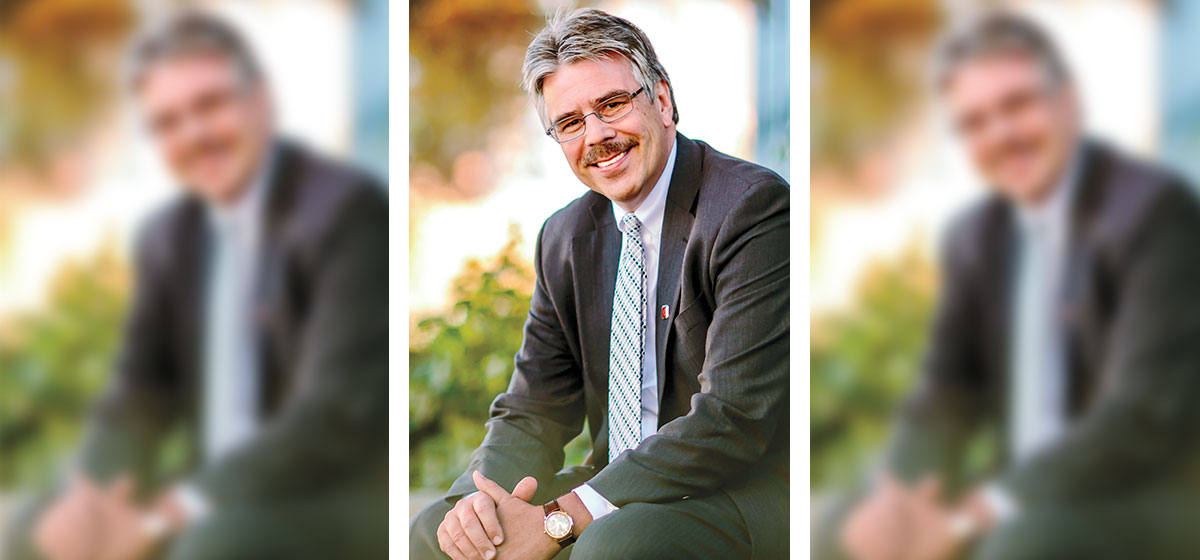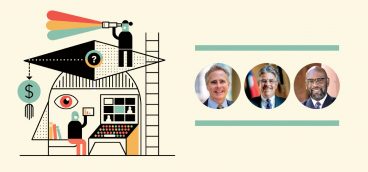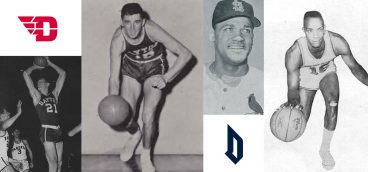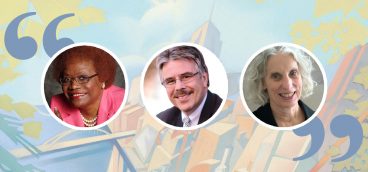Ken Gormley: Lawyer, Teacher and Author

I was the first person in my family to be born in Pittsburgh. My brothers and sisters have always said that this accounts for my “irrational” loyalty to the city.
My dad grew up on a farm in Kentucky and was the odd person in his family—the one who left home to get a Ph.D. in chemistry at New York University. That’s where he met my mom.
Mom was the daughter of Italian immigrants and went to Hunter College when my dad was student-teaching there. Eventually, they got married and ended up in Pittsburgh because it was located halfway between both of their hometowns, and they could visit relatives from both sides for vacations.
My dad’s first job was as a chemist at Mellon Institute, and my mom became a third-grade teacher at St. Anselm’s in Swissvale. That’s where I grew up, on the edge of Swissvale and Edgewood. But even though my mom and dad were both educated, we still viewed ourselves as milltown folk. Most of our friends’ parents worked at Union Switch & Signal, Kopp Glass or the Edgar Thomson Steel Works. We lived in a little, two-bedroom house on West Swissvale Avenue, and my mom and dad slept on a pull-out couch in the living room. My space was a cot at the top of the stairs. Because our house was directly across from Union Switch, I could feel the rumble of the trains as they arrived at night. And if I closed my eyes, I could hear the barge whistles, their horns blowing and drifting toward us as they traveled on the Monongahela river in the valley.
I have two brothers and two sisters, and we all attended school at St. Anselm’s. On weekends, my friends and I would often take a streetcar down to Forbes Field in Oakland to watch the Pittsburgh Pirates play. We couldn’t afford tickets, but the gates would be thrown open in the seventh inning, so we got to see the rest of the game for free.
Ken Gormley
Lawyer, teacher and author
- Duquesne University, President (2016–present)
- “The Death of American Virtue: Clinton vs. Starr,” Author (2010)
- Duquesne University School of Law, Dean (2008–2015)
- Duquesne University School of Law, Professor (1994–present)
- Borough of Forest Hills, Mayor (1998–2001)
- “Archibald Cox: Conscience of a Nation,” Author (1997)
- Justice Ralph J. Cappy, Pennsylvania Supreme Court, Clerk (1990–1991)
- Mansmann, Cindrich & Titus, later Cindrich & Titus, Attorney (1985–1994)
- University of Pittsburgh School of Law, Visiting and Adjunct professor (1982–1994)
- Judge Donald E. Ziegler, Clerk (1980–1982)
- Harvard Law School, J.D. (1980)
- University of Pittsburgh, B.A., Political Science (1977)
As a kid, I was a paper boy for the Pittsburgh Post-Gazette. Every year, during the holidays, while on my route, one particular Slovak lady would welcome me with a warm nut roll as a present. Another customer, Mr. Kochick, greeted me on my birthday with a little desk set containing scissors and a letter opener, because he wanted me to go to college.
For my parents, everything was about education. They wanted to put all of us kids through college, so they saved every penny for that. My oldest brother got into Notre Dame, and the rest of us were accepted at different schools. To that, my dad would say, “That’s great. But here’s a roll of quarters for the bus. You’re all going to Pitt.” It was the most economical choice.
For my first two years at the University of Pittsburgh, I commuted from home. I started as a math major, getting As in calculus. (how, I’ll never know.) But then I figured that I should get out while the getting was good, and gravitated toward philosophy and political science, the latter inspired by Dr. Bill Keefe (who remains a mentor, at age 94, to this day).
For my third and fourth years, I moved into an apartment in Oakland with five friends. I also began writing articles for The Pitt News, starting a regular column called “The Undercover Reporter.” This was the time of “new journalism,” when people would purposefully experience things just so they could write about them. My column was essentially a license to do weird stuff.
I set a Guinness World Record for brick carrying. I wrestled a bear at the Sportsman Show at the Civic Arena (and lost). I also assisted in a cremation and, lo and behold, I won the first Rolling Stone College Journalism Award for feature writing. Part of the award was a trip to New York to work at the magazine’s offices for a couple of weeks. That’s when I decided that I didn’t want to write for a living. I concluded that my family, if I ever had one, would starve if I had to eke out $50 for each little story I wrote. As a result, I began debating between getting a Ph.D. in political science or going to law school, and concluded that the latter was more practical. After all, with a law degree, I could do things to help people.
I graduated from Pitt in 1977 and, somehow, was accepted into Harvard Law School. So, I moved to Somerville, near Boston, where I lived with five guys who shared working-class backgrounds. One of them was Mark Warner, who went on to become Governor of Virginia and is now a U.S. Senator from that state. Mark and I have stayed close. In fact, our whole class has remained friends. It was a wondrous experience.
From the start, I loved the law, especially as it related to our system of government. Archibald Cox, who had been U.S. Solicitor General under President John F. Kennedy and special prosecutor during the Watergate scandal, taught me constitutional law. I almost fell out of my chair when, one day, he asked me if I wanted to be a teaching assistant for him. I didn’t even think that he knew who I was. But I did well on class papers, and soon began teaching undergrads at Harvard.
A few years later, I had to face the decision of what to do after law school. I was offered a position at a banking law firm in Hawaii and a job teaching legal writing at the University of Miami, in Coral Gables, Florida. But, alas, these places just weren’t Pittsburgh. I had gone to law school intent on coming back home to make my contribution in my hometown. So, I returned and looked for a judge who I thought could be a mentor, and found Judge Donald Ziegler, a U.S. District Judge for the Western District of Pennsylvania. He was a great jurist and one of the most ethical people you could ever imagine.
I actually thought that, after my clerkship with “Judge Z,” I would become a lawyer in a two- or three-person law firm in Swissvale. But soon, I caught wind that the University of Pittsburgh School of Law was looking for someone to launch a legal writing program for minority students and women who were returning to school after having kids. John Murray was the dean of the Pitt law school at the time, and I started writing letters to him, telling him why I was the perfect candidate for the job, until he finally called me and said, “You have the job, Ken. Now, stop writing me letters.”
In 1984, at a Jimmy Buffett concert in New Jersey, through friends I met a young woman named Laura Kozler, which turned out to be one of the greatest things that ever happened to me. I knew, instantly, that she was the person for me.
Laura and I stayed in touch with each other by writing letters. When I opened my mailbox and saw an envelope with her handwriting on it, my heart just leapt. She lived in New Jersey and was working in New York City. After a time getting to know me better via U.S. mail, Laura moved to Pittsburgh and got a job at Pitt in admissions and financial aid. She and I had so much in common. But the main thing was, we agreed that we would not allow money to be the deciding factor for anything we did. We wanted to do things that were worthwhile and meaningful. But I have to say that Laura was more than startled when I said, “I love you, and I’ll do anything for you, but I’m not sure I could leave Pittsburgh.” So, we left it at that. We were married on June 28, 1986, on my parent’s 41st anniversary, and moved into a little place in Regent Square. Before too long, we bought a house in Forest Hills.
You can ask any of my law school friends, including Mark Warner, and they’ll tell you that the whole time I was at Harvard, I bragged about how great Pittsburgh was. When I returned to the city after Harvard, many of them thought I was throwing my life away by not going to a big law firm and making big bucks. But I believed that, if I stayed committed to what I loved and what was important to me, success would follow.
“… and they’ll tell you that the whole time I was at Harvard, I bragged about how great Pittsburgh was.” —Ken Gormley
In time, I graduated into teaching first-year courses in property and state constitutional law at Pitt, inspired by a young hotshot professor named Mark Nordenberg, who became a close friend. But I felt like a fraud because I was teaching subjects in which I had no practical experience. So, I decided to go out and practice law to become a better teacher.
With a Harvard law degree, you can pretty much “write your own ticket,” but I looked at only two small firms and chose Mansmann, Cindrich and Titus. Bob Cindrich and Paul Titus had reputations as the best, most ethical lawyers in the business. It was a remarkable experience. I tried criminal and civil cases. I argued in the State Court of Appeals. I did corporate work. I was even second chair on a murder case. I had responsibilities that I would never have had anywhere else.
While at the firm, I continued to teach as an adjunct professor at Pitt law school and wrote law review articles at night to establish the credentials necessary to get a permanent job teaching law. I also clerked part-time for Ralph Cappy on the Supreme Court of Pennsylvania, drafting opinions on state constitutional law with him.
Laura wanted to stay at home, have kids and raise them, and we knew that we’d have to make some concessions to do this. So, we bought a van for her, and I took a bus to and from work. We were determined that, if and when we had them, our kids would come first.
Writing law review articles, however dry, was good experience. It required discipline. But in the process, I started daydreaming about writing a book, and narrowed it down to two topics: a biography of Roberto Clemente, one of my childhood heroes; or a biography of Archibald Cox, my old Harvard professor. I decided to take a stab at the Cox book.
Archibald Cox was intimidating. But I wrote to him about my idea, and he wrote back saying, “This is too serious to talk about in letters. The next time you’re in Boston, we’ll talk about it.” Of course, I took a train to Boston the next week.
At that point, I had done nothing but write about wrestling bears at Pitt and some features for The Pittsburgh Press. I had never approached anything of this magnitude. Finally, Professor Cox agreed that he would let me work on his biography, but was making no promises about how long he would continue to cooperate.
I took an unpaid leave from the law firm for the summer. We had just had our first baby, but Laura was very supportive, even though many of our friends thought I was nuts. I moved to Boston, and stayed in an empty dorm room, with no air conditioning. Whenever Professor Cox was in his office and had time, I’d go and start the tape recorder rolling as I asked him questions about different periods of his life. I didn’t think it would end up being a great book because I thought that Cox had played only bit parts in many big things. But as I started interviewing famous people—from Supreme Court Justices and John Kenneth Galbraith to Arthur Schlesinger, Teddy Kennedy, and so on—I realized that he actually had played major roles in major historical events, but was too modest to say so.
When “Archibald Cox: Conscience of a Nation” was published in 1997, it got a great review in The New York Times, and I remember going down to the Pitt Bookstore and seeing, in the window, a big sign with my book featured on it. I couldn’t believe it. I had gone from writing Pitt News articles about ginkgo berries to this. And then, just after the book came out, the Monica Lewinsky story broke in the press. That’s when I realized that life is largely driven by the unexpected.
All of a sudden, the media started calling me because I was seen as an expert on special prosecutors, having written about Cox and Watergate. National TV networks and news services came to my house to interview me. And I began writing op-eds for newspapers all across the country. I even attended the first day of President Clinton’s impeachment trial.
Most of the op-eds I wrote would have been viewed as pro-Clinton because I didn’t think he had committed an impeachable offense, however abhorrent his behavior was. But I made a decision that the only way I would write a book about the Clinton impeachment was if both sides cooperated. If Ken Starr wouldn’t cooperate, I wouldn’t do it because I wanted to write the definitive historical account of the case. To my good fortune, Starr agreed, almost right away, and then, over a period of years, his team cooperated, as did Monica Lewinsky, Paula Jones, U.S. Senators from both sides, Janet Reno, and then, finally, Bill Clinton.
I conducted four interviews with President Clinton, two of them at his home in Chappaqua, New York. Driving back to Pittsburgh after the second interview, over the Hudson River, with the water sparkling below, I thought, “I’m the only person in the world who got to talk to all of the people on both sides of the case.” The experience changed my life.
“The Death of American Virtue: Clinton vs. Starr,” published in 2010, was a New York Times Best Seller. It took me 10 years to complete and, to this day, the most satisfying thing is to receive letters from people of all political stripes who believe that my treatment of the subject was balanced and fair.
By 1994, John Murray was president of Duquesne University and encouraged me to think about becoming a professor there. So, I did, and was hired for a fulltime position at Duquesne law that summer. Laura was pregnant and a new baby was born just two weeks later.
During this time, I was completing a stint as executive director of the Pennsylvania Reapportionment Commission, working on that project with Bob Cindrich. I also ran for Mayor of Forest Hills (for reasons still unclear to my wife) and won. We created a community development corporation there to redevelop the town’s tiny business district. Later, I became president of the Allegheny County Bar Association, which was a fabulous experience. In my life, I have always pushed forward so that each of my endeavors built upon the last, and strangely enough, I discovered that I liked the administrative piece of the puzzle, helping to run things. I learned that I was good at it, too.
At Duquesne, I organized some big programs. I got U.S. Supreme Court Justice Sandra Day O’Connor to come and speak before a thousand people. I hosted a program on the 50th Anniversary of Brown v. Board of Education, working with Max King at the Pittsburgh Foundation, and organized a program on President Ford’s pardon of Richard Nixon, both of which were broadcast nationally.
But by 2008, Duquesne’s Law School was experiencing turmoil. Certain people had been in charge for decades, and many felt that changes were needed. After John Murray stepped down as president, Charlie Doughterty took his place, removed the law school dean mid-year, and asked me to step in as interim dean. I felt like I was being deployed to a battlefield. So, I talked it over with Murray, who was now chancellor, and he convinced me that I owed it to the institution to help.
One of the joys of that time, for me, was that two of my kids went to school at Duquesne. I’d be up in the dean’s office and one would come and want me to go over a paper with them, or to talk about a course that was driving them crazy—and then, of course, hit me up for two bucks to go to Starbucks afterwards. I loved seeing them thrive. Duquesne was part of their lives, too.
In early 2015, unexpectedly, Charlie Doughterty announced his retirement, and people started asking me if I was going to put my hat in the ring for the president’s job. I had been approached by a couple of other schools regarding the same position, but they were in other cities, so I never pursued them.
When our son got his residency at Tufts Medical Center in Boston, after graduating from pharmacy school at Duquesne, Laura and I had a long drive home together, and talked seriously about the president’s job at Duquesne. We decided that I should go for it. I was either a fit for that moment in time, or not. So, I applied for the president’s job, and got it. And thus began another exciting period in my life.
I was officially made president of Duquesne University in September 2016, and the inauguration was truly amazing. I remember proceeding down Academic Walk, in full regalia, before hundreds of lookers-on, including Bishop David Zubik and representatives of other universities. All along the way were students, wearing T-shirts, holding signs and cheering. I just wish my mom and dad could have been there. (Dad died in 2001; mom, in 2002.) But I had my mom’s Phi Beta Kappa pin and my dad’s Pittsburgh Chemists Society pin both inside my jacket, under my robe, so they really were with me the whole time.
It’s a big deal to be president of a university. One thing that I’ve learned is that the trappings of the position are not what is significant. What’s more important, given a limited amount of time on earth, is not to do things for oneself, but to do things for other people. At the center is family and friends. I am very close with my family and, when I have a challenging day at work, I will often reach out to an old friend, or simply go to Rudy’s in Swissvale for an Italian hoagie.
My brothers and sisters have all made their own contributions in life, about which I’m very proud. And I have four kids; two of them went to Duquesne, and two to Pitt; two are still here, and two are living elsewhere. They’re still works in progress, but Laura and I are especially proud of them. And I often visit the cemetery where my mom and dad are buried. Without them, the life that I have lived and continue to live would not have happened.
Every night, I look forward to going home and talking with Laura. She has been the CEO of our house, and project manager for every project we’ve done. She’s an amazing mother. And we often field calls from our kids (and others) who have things about which they want her advice. We do everything as a team. I can’t imagine where I would be in my life if Laura hadn’t entered it.
As the years fly by, I’ve come to appreciate more and more how special Duquesne is. And I’ve come to be inspired by the Spiritan priests who came here in the 1870s to help the new immigrants, working in the mills and factories, to have a chance at an education. Through their efforts, Duquesne helped to build Pittsburgh. And I always remind myself that our job is to reimagine things for a new era, and bring it to life.
Laura and I still live in the same house we bought 33 years ago. I always say that Forest Hills is where people from Swissvale go when they’ve made it. We have wonderful neighbors, many of whom I’ve known since I was a kid. So, when people ask, “What are you going to do next, Ken?” I say, “I have the greatest job in the world. I can’t imagine anything better.”





